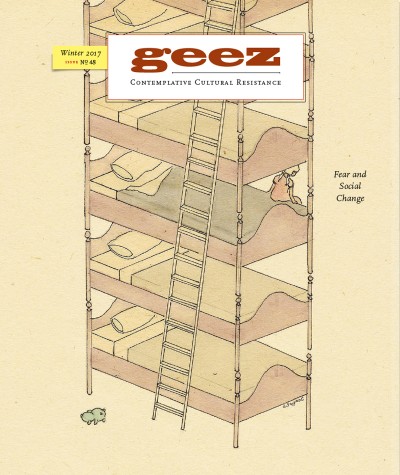Editorial: Some Benefit from Fear
If I consider what I am afraid of, and if I consider the lines of oppression in our society, I realize that I probably don’t fear the same things as people of colour, women, those who are under-employed or homeless, or those who engage in civil disobedience.
It’s taken me a long time to recognize that cultural fears benefit of some over others. They support white superiority, maintain the sanctity of private property at the expense of those in search of shelter, help the rich feel fortunate as they drive by those who line up for meals, and sustain notions of deviance for anyone that challenges these norms.
For example, I am not afraid of getting hassled by police if I walk in our city’s North End, even though officers routinely stop and interrogate people, and have beaten and killed people. (Although I am afraid of police when I stop to monitor street arrests.)
I am not afraid of getting evicted from our home, even though over the last decade, three of the four apartment buildings adjacent to our house had owners that evicted the renters and sold their suites as condos. I’m in a class protected by laws of home ownership.
Every day I am not afraid of getting sexually assaulted. This not just because I am lucky; it has more to do with the social location of my body. Statistics Canada recently reported that, “A higher risk of sexual assault was noted among those who were women, young, Aboriginal, single, and homosexual or bisexual, and those who had poorer mental health.
In addition, individuals who had certain experiences—childhood abuse and homelessness—and more evening activities outside the home also had a higher risk of sexual assault.” To the contrary, I fall into the category of those who perpetuate fear: the same report said 98 percent of those accused and charged with sexual assault were male.
In this issue of Geez magazine we want to explore how those in power exploit fear as a means to maintain a social and economic system that favours some over others.
There is a positive side to investigating how fear is used to maintain systems of injustice. For example, when fear is vague, it can produce dread.
“The more we don’t know what or who it is that we fear the more the world becomes fearsome,” writes Sara Ahmed in a chapter on fear in her book, The Cultural Politics of Emotion. This vague fear can lead individuals to close down, fend for themselves, and support security measures that limit freedom of movement and information.
However, when the object of fear is exposed and becomes a clear and present danger, it is easier to address; it stirs up courage from among those who resist, which, in turn, can inspire others to open up and act in solidarity.
As one whose roots lie in the Christian tradition, I used to gain inspiration from the words of the agitator as he addressed the peasant masses in a time of foreign occupation. The one who resisted oppression repeatedly said, “Do not be afraid.”
Now the challenge for me is to recognize my social location and relearn to whom this consolation is directed. My inheritance is that of the colonizer, but my allegiances can shift. I can move towards greater hospitality, solidarity, and resistance and thereby participate in a grand emancipation from fear.
Aiden Enns is editor of Geez magazine.
Dear reader, we welcome your response to this article or anything else you read in Geez magazine. Write to the Editor, Geez Magazine, 400 Edmonton Street, Winnipeg, Manitoba, R3B 2M2. Alternately, you can connect with us via social media through Twitter, Facebook, or Instagram.



Sorry, comments are closed.